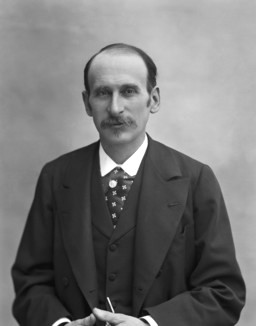Jacques Marie Eugène Godefroy Cavaignac facts for kids
Godefroy Cavaignac (born May 21, 1853 – died September 25, 1905) was an important French politician. He was known for his strong beliefs and his role in the French government during a time of big changes. He also played a part in a famous event called the Dreyfus Affair.
Contents
Early Life and Beliefs
Godefroy Cavaignac was born in Paris. His father was Louis Eugène Cavaignac, who was also a well-known figure. Even as a schoolboy, Godefroy showed his strong support for a republic, which is a country run by elected officials, not a king.
In 1867, when he was still young, he refused to accept a prize at the Sorbonne. He did this because the prize was being given by the Prince Imperial, who was the son of the emperor. This showed how much he believed in republican ideas.
Starting a Career in the Third Republic
Godefroy Cavaignac fought in the Franco-Prussian War and received a military medal for his service. In 1872, he joined the École Polytechnique, a famous engineering school. After his studies, he worked as a civil engineer in Angoulême until 1881. Later, he became a master of requests in the Council of State, which is a high-level government advisory body.
Becoming a Deputy and Minister
In 1882, he was elected as a republican deputy for Saint-Calais in the Sarthe region. A deputy is like a representative in a country's parliament.
He held several important government jobs:
- From 1885 to 1886, he was the undersecretary for war.
- In 1892, he became the Minister of Marine and of the Colonies. This meant he was in charge of the navy and France's overseas territories.
- From 1895 to 1896, he served as the War Minister. This role put him in charge of the country's military.
Role in the Dreyfus Affair
Godefroy Cavaignac became War Minister again in 1898. During this time, he was involved in the famous Dreyfus Affair. This was a big political scandal in France.
In July 1898, Cavaignac told the French National Assembly (France's parliament) about documents that seemed to prove Captain Alfred Dreyfus was guilty of treason. However, Cavaignac's own investigator, Captain Louis Cuignet, later found out something shocking. The most important document used against Dreyfus was actually a fake!
When questioned, Colonel Henry admitted he had forged the document. Even after this discovery, Cavaignac still believed Dreyfus was guilty. He resigned from his position but continued to argue that Dreyfus was not innocent. He became a leader of a group in parliament that held similar views.
It's interesting to note that a 1937 movie, The Life of Emile Zola, showed Cavaignac differently. In the film, he was shown as the person who finally found the truth and demanded that those responsible for wrongly accusing Dreyfus should resign.
Later Political Efforts
Cavaignac was also a strong supporter of the Ligue de la Patrie Française, a group that promoted nationalist ideas. In 1899, he tried to become the French President but was not successful.
Later Life and Passing
Godefroy Cavaignac had decided to step away from political life. He passed away at his home near Flée on September 25, 1905, when he was 52 years old.
Written Works
He wrote an important book called Formation de la Prusse contemporaine (which means "Formation of Contemporary Prussia"). This two-volume book, published between 1891 and 1898, was about the Napoleonic Wars and the events that happened from 1806 to 1813.
See also
- History of France in the nineteenth century
- Republican Union (France)
- Opportunist Republicans
- Radical-Socialist Party
- History of the French Left
- Dreyfus Affair
 | Calvin Brent |
 | Walter T. Bailey |
 | Martha Cassell Thompson |
 | Alberta Jeannette Cassell |


